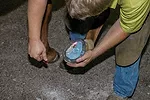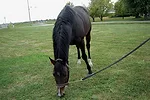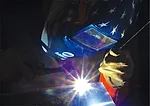Advertise Follow Us
American Farriers Journal

View Archived Issues
December 2013
Volume: 39
Edition: 8
American Farriers Journal is the “hands-on” magazine for professional farriers, equine veterinarians and horse care product and service buyers.
-
Table Of Contents
Table Of Contents
Shoeing For A LivingChanging Times, Changing Practice
While Tennessee farrier John Schmidt’s practice has diversified over the past few years, his commitment to high quality work has never waveredRead MoreFor Therapeutic Work, Farriers Need to Develop More Than Just Shoeing Skills
Ability to work as part of a team, think through problems and an understanding of anatomy and mechanics are vitalRead MoreThink the Situation Through Before You Pick a Therapeutic Shoe
Mechanics, cause and effect and a proper trim and fit are all aspects of the successful shoeing packageRead MoreAdding Hospital Plates To Your Hoof-Care Arsenal
Learning to craft these in different styles and from a variety of materials expands your ability to help when horses are injuredRead MoreChanging the Way You Work
With bodily pain and discomfort, you must pay attention to what your body is telling youRead MoreTackling Unsolved Mysteries
Unanswered questions deal with the shape, angle, position, center of rotation and proper referencingRead MoreDay With A Clinician Program Continues To Help Spread Hoof-Care Knowledge
International Hoof-Care Summit attendee, Delta Mustad clinician team up to tackle horses’ lameness issuesRead MoreWorking With Aluminum? Consider TIG Welding
Massachusetts farrier Mike Phillips finds that TIG welding can connect aluminum shoes and creative therapeutic applicationsRead MoreWorking For Vet Clinics Pays Off For Horseshoers
Independent veterinary clinics provide opportunities for farriers searching to expand their practice and take on challenging workRead MoreAcross The Shoeing Economic Divide
The equine economy is bouncing back in the Pacific Northwest, but more so west of the Cascades than eastRead MoreYou and Your Horse's FeetUnderstanding The Common Problems Of The Hoof And The Foot
Learning the basics can help novice horse owners get the help they need to head off minor issues before they become majorRead MoreRemembering Dave Willis
Farriers share the impact that the Hall Of Fame shoer and Anvil 21 member made on their lives and the footcare industryRead MoreThe Hoof-Care Bottom LineOrganize Your Expenses To Help Your Business
A yearlong categorization of expenses related to your footcare practice will benefit you in preparation for determining income taxRead MoreDelivering As An All-Around Farrier
Farrier Shawn Nanny has established a thriving practice based on shoeing the utility horse of central TexasRead MoreUsing An Evidence-Based Treatment In A Fractured Navicular Bone Case
Diagnostic imaging plays a key role in this non-intrusive method that helped a horse return to the show ringRead MoreSpotlight on Hoof CareVet And Farrier Volunteer To Train Romania’s Farriers
Equine vet Amy Rucker and farrier Jim Keith join mission trip to Romania to work on horses and help train local farriersRead More
















